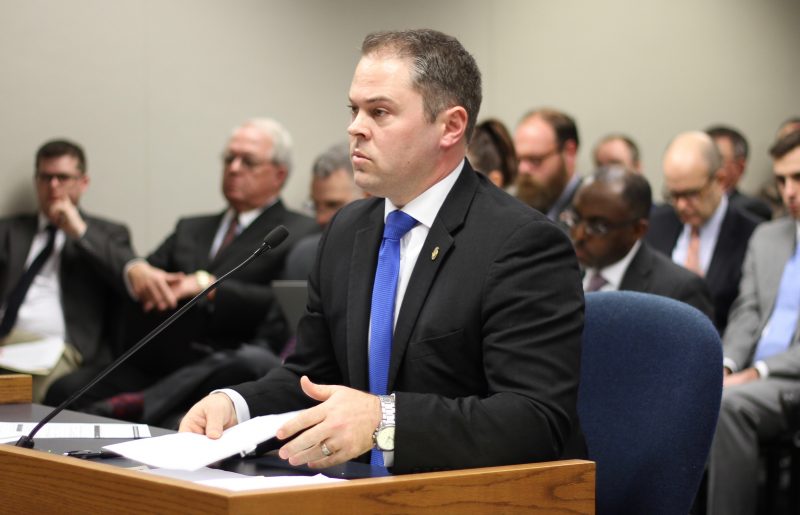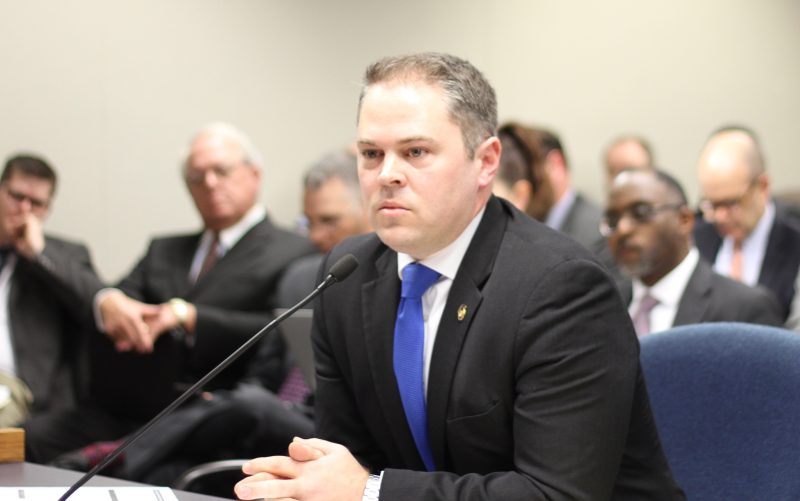JEFFERSON CITY, Mo. — The tax plan presented by Rep. Elijah Haahr to the Ways and Means Committee on Monday appears to be a solid start in the House. In the standing-room-only hearing that lasted two hours, HB 2540 was discussed and analyzed by a multitude of stakeholders.
The Speaker Pro Tem called the legislation his answer to what the tax code would look like after a redesign. His answer also happens to be 429 pages long with a 59-page fiscal note.
“I began this exercise by looking at three different goals: building a tax code that would spur economic activity in the state, promote balanced disparity across the board, and generate revenue for our core state functions including infrastructure and transportations,” Haahr said.
During the hearing he said he was open to making changes, calling the bill a starting point for House discussions. The Governor has proposed a tax plan and the Senate is moving forward on a bill championed by Sens. Bill Eigel and Andrew Koenig.
The legislation Haahr presented sets itself apart from other tax plans in the General Assembly by the proposed income tax rates. HB 2540 would reduce the state’s highest personal income tax rate from 5.9 percent to 5.0 percent and the corporate income tax from 6.25 percent to 5.0 percent.
“We would make our income tax rate the same as our business tax rate, thereby avoiding people trying to game the system by changing the way they earn money,” said Haahr. “Whether you are a business or an individual, you would be taxed the same way.”
These provisions will make Missouri more competitive, according to Matthew Panik who is the Vice President of Governmental Affairs at Missouri Chamber of Commerce and Industry
Currently, Missouri has 10 different tax income brackets. With this bill, two brackets would be eliminated and then the brackets would be adjusted each year based on inflation.
It was pointed out that the current tax brackets have never been adjusted for inflation, which is why the top tier currently starts at $9,000. As such, Rep. J. Eggleston wondered if going to a flat tax would be a way to go. Haahr was not opposed to the idea.
With cutting taxes, it means less general revenue generated by taxes, a point the concerned some. A few testifying against the bill thought reducing revenue could have a negative impact on education and children.

“Basically, when you don’t have revenue, the money doesn’t go into education,” Jim Moody with the Civic Council of Greater Kansas City said. The civic council is an organization comprised of the CEOs of major corporations.
“Our CEOs think the workforce is not adequately educated in Missouri and that is where they get their employees from. They would like to see more money go into elementary and higher education,” said Moody.
Kids Win Missouri voiced concern that the hit to general revenue would have a negative impact on children in the state.
A point of concern when cutting taxes is making sure Missouri does not become the next Kansas. But Haahr points out that Kansas did drastic cuts without including a provision to generate revenue, but his plan does.
The legislation would have Missouri join the Streamlined Sales Tax agreement, which would phase out the federal income tax deduction for those with more than $150,000 in income, would eliminate the circuit breaker tax credit for renters, would eliminate the sales and use tax allowance, would eliminate the three factor apportionment for corporations, and increase vehicle fees.

A key component of the bill is generating revenue for road and bridges in Missouri. Haahr’s bill does this by putting vehicle user fees in line with inflation and other states. Haahr noted the state’s current vehicle license and registration fees were put in statute in 1984, and have not changed in more than 30 years. His bill would update fees from their 1984 value to present day value.
“When you renew your driver’s license over a six-year period of time, it’d be about $7 [more],” said Haahr. Which calculates out to be just over an additional dollar a year, according to Haahr.
“The one part that concerns me, you have in there that every three years moving forward, there would be another calculation and another fee raise automatically,” Eggleston said. The adjustment would be based on inflation.
The three-year readjustment was a provision Haahr would be willing to part with, along with a fee increase on vehicle inspections.
The fact that the bill goes the route of increasing vehicle fees to fund transportation infrastructure instead of a gas tax sets it apart from the other tax plans.
“The gas tax, in my opinion, is kinda a relic of a bygone era,” Haahr said. “It’s just not a good generator of funds to fuel roads and bridges in the state.”
Increased fuel economy in vehicles and electric vehicle not even using gas creates a problem with using a gas tax to generate revenue, according to the bill sponsor.
It was pointed out, that a gas tax puts the burden of funding the state’s transportation infrastructure on everyone who uses it, including out of staters. On the other hand, user fees put the entire burden on Missourians.
The provision in the bill enabling Missouri to join the Streamlined Sales and Use Tax Agreement has business interests split. According to Haahr is would put Missouri-based retailers on equal footing with online stores.
Streamlining would put Missouri’s definition in line with 23 other state — six which board Missouri. While the Missouri Chamber of Commerce and Industry is in support of joining the agreement, the Missouri Retailers Association opposes this part of the bill saying it will add complexity.

“If you took the Streamline part out of this, which I think is only a $10 million gain to the system, we can just wait on the U.S. Supreme Court to decide on the case that is before them now and may end up getting all of the benefit and none of the risk,” said Ray McCarty, president of Associated Industries of Missouri, who found some technical issues within the Streamline provision in the bill.
Eliminating the sales and use tax allowance as a way to generate revenue was also a point of contention. Under current statute, a vendor is allowed to retain 2 percent of the amount of sales or use tax to the state if the vendor timely remits the amount due on or before the due date.
Several who testified for information purposes — such as the Missouri Restaurant Association and the Associated Industries of Missouri — spoke of the necessity of maintaining the tax allowance.
“That is the only compensation the state gives to retailers and employers who are filling out all the forms,” said McCarty. “It is also compensation for them acting as tax collection agents for the state. And very often if they make a mistake in how the taxes are collected they have to pay out of their own pockets.”
The committee took no action on the bill.

Alisha Shurr was a reporter for The Missouri Times and The Missouri Times Magazine. She joined The Missouri Times in January 2018 after working as a copy editor for her hometown newspaper in Southern Oregon. Alisha is a graduate of Kansas State University.












